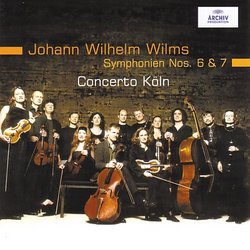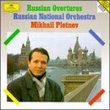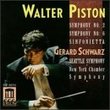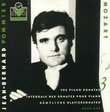| All Artists: Johann Wilhelm Wilms, Werner Ehrhardt, Concerto Köln Title: Johann Wilhelm Wilms: Symphonien Nos. 6 & 7 Members Wishing: 0 Total Copies: 0 Label: Deutsche Grammophon Release Date: 8/10/2004 Genre: Classical Styles: Chamber Music, Historical Periods, Classical (c.1770-1830), Symphonies Number of Discs: 1 SwapaCD Credits: 1 UPC: 028947450825 |
Search - Johann Wilhelm Wilms, Werner Ehrhardt, Concerto Köln :: Johann Wilhelm Wilms: Symphonien Nos. 6 & 7
 | Johann Wilhelm Wilms, Werner Ehrhardt, Concerto Köln Johann Wilhelm Wilms: Symphonien Nos. 6 & 7 Genre: Classical |
Larger Image |
CD DetailsSimilarly Requested CDs
|
CD ReviewsWHO? DAVID BRYSON | Glossop Derbyshire England | 09/11/2004 (5 out of 5 stars) "He is not even listed in my Oxford Companion to Music (10th edition), this Johann Wilhelm Wilms. He was a contemporary of Beethoven, born two years later and outliving the great man by 20 years. He was born a German, but moved to Amsterdam at an early age believing that to be the land of promise. What he found was that the kudos and the money went to performers not to composers, and perforce he had to earn his own living largely from performing and teaching. His music, if these two symphonies (his final two) are anything to go by, is agreeable but straitlaced. Even after Beethoven was dead Wilms was still writing symphonies very much to Haydn's general formula, with slow introductions to the first movements and very fast finales. The idiom is slightly updated from Haydn, but if I were to try to characterise it I would be reduced to calling it not-Haydn and not-Beethoven, and very very definitely not Mozart. The nearest parallel might be the early symphonies of Schubert, and it is only fair to Wilms to note that he had a genuine melodic gift, something that shows through particularly in the slow movements. These two works seem to me to be absolute models in a Toveyan sense, and very nicely scored too. They are not `great' symphonies, but then neither are Weber's. However Weber's music is bursting with originality even in his lightweight mode, whereas a Wilms symphony is more an experience in which `the second subject, a graceful and flowing melody in contrast with the rugged vigour of its predecessor, enters in the key of the dominant' and does similar things beloved of commonplace all-purpose programme-note writers. I do not know whether Wilms gave the option of repeating the exposition in his first movements, but if he did the performers decline it, and rightly so in my opinion.
The Concerto Koeln is directed from the leader's desk by Werner Erhardt. The group photographs show 14 players, but the sound suggests something nearer 40, and the full list of participants in the Concerto Koeln is somewhere around that figure. The recorded sound is to the very high standard that has become routine these days, and I experienced a satisfying feeling of fairness to the composer as I listened to this thoroughly agreeable and undemanding music, whose manuscripts had long been lost. The liner note by Ernst A. Klusen is notably sympathetic, and Erhardt himself also contributes a short note. It brings back the lines of the poet to me `Dead clay that did me kindness,/I can do none to you'. What I can do, what anyone can do for the shade of Wilms is to take an interest in this pleasant record, and I would like to thank Archiv as well as the performers while I am about it." |









